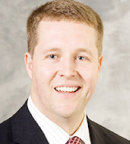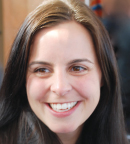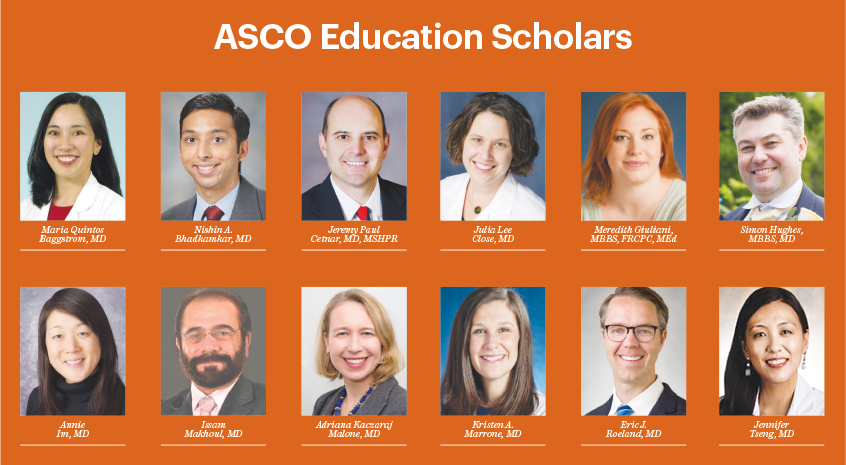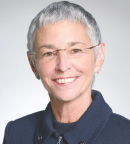Education is such an integral part of ASCO’s strategic plan to reduce the burden of cancer for all patients, it is incorporated into the Society’s mission statement to “conquer cancer through research, education, and promotion of the highest patient care.” In 2017, ASCO’s Board of Directors voted to establish the Education Council, to ensure the Society’s educational goals and strategies were consistent across ASCO’s meetings, symposia, digital education, and training programs. The newly formed Education Council consists of 12 members charged with bridging educational gaps, advising on the latest advances in educational tools, and assessing new education programs and proposals.

“We want to improve the educational experience our members have in person at the Annual Meeting, in print through our publications, and in the moment-to-moment educational experience through their mobile devices.”— Sam J. Lubner, MD
Tweet this quote
“The Education Council is a way for ASCO to broaden its reach with members as they interface with information in new ways,” said Sam J. Lubner, MD, Associate Professor in the Division of Hematology, Medical Oncology, and Palliative Care at the University of Wisconsin School of Medicine and Public Health, Madison, and a member of the Education Council.
“Oncologists are using a variety of ways to gather cutting-edge medical research information now,” he continued. “The material exists not just in the medical library, but in your home on your desktop computer, on your smart phone, and on other mobile devices as well. We want to improve the educational experience our members have in person at the Annual Meeting and at the thematic meetings; in print through our publications, including the Journal of Oncology Practice and the Journal of Clinical Oncology; as well as in the moment-to-moment educational experience through their mobile devices.”
Building Leadership Skills in Education
IN CONJUNCTION with the creation of the Education Council, ASCO launched the Education Scholars Program (www.asco.org/training-education/professional-development/education-scholars-program), a yearlong professional development initiative modeled after ASCO’s Leadership Development Program, to build clinician educators’ leadership skills aimed at enhancing ASCO’s learning portfolio and overall medical education. The program’s objectives are to help participants to:
- Understand cognitive science and adult learning theory and apply it to an ASCO learning activity, with the intention of integrating the activity into ASCO’s education portfolio
- Develop expertise in the design of education activities
- Advance medical education within ASCO as well as at participants’ institutions and in their medical communities
- Engage in leadership development activities with an executive leadership coach
- Serve on an ASCO-focused education committee or planning group to lead the integration of learning science—an interdisciplinary field that aims to further the scientific understanding of learning, the design and implementation of learning innovations, and the improvement of instructional methodologies—into additional programs and activities after completion of the Education Scholars Program.

Michal Tibbits, MA
The program was well received, and ASCO was deluged with applications, but only 12 participants are accepted into the program each year. “We didn’t know what the membership response would be for this program since it targets such a specific group: people with a strong commitment to both fields—oncology and education,” said Michal Tibbits, MA, Director of Professional Development at ASCO. “But we received dozens of applications from highly qualified medical educators, and it was difficult to whittle down the selection to 12.”
To qualify for the program, participants must be ASCO members beyond fellowship training and be willing to commit to travel to ASCO headquarters in Alexandria, Virginia, for four 3-day training sessions throughout the year.
The 12 ASCO Education Scholars selected for the inaugural program are (see photos below):
- Maria Quintos Baggstrom, MD, Associate Professor in the Department of Medicine, Oncology Division, at the Washington University School of Medicine in St. Louis, Missouri
- Nishin A. Bhadkamkar, MD, Assistant Professor, General Oncology at The University of Texas MD Anderson Cancer Center in Houston
- Jeremy Paul Cetnar, MD, MSHPR, Assistant Professor of Medicine, School of Medicine at Oregon Health & Science University in Portland, Oregon
- Julia Lee Close, MD, Assistant Professor of Medicine at the University of Florida Health Shands Cancer Hospital in Gainesville
- Meredith Giuliani, MBBS, FRCPC, MEd, Assistant Professor in Radiation Oncology at Princess Margaret Cancer Centre in Toronto
- Simon Hughes, MBBS, MD, Clinical Oncologist at Guy’s and St. Thomas’ NHS Foundation Trust in London
- Annie Im, MD, Assistant Professor of Medicine in the Division of Hematology/Oncology at the University of Pittsburgh
- Issam Makhoul, MD, Professor of Medicine and Director of the Division of Medical Oncology in the Department of Internal Medicine at the University of Arkansas for Medical Sciences in Little Rock
- Adriana Kaczaraj Malone, MD, Assistant Professor of Medicine in Hematology and Medical Oncology and Assistant Professor in Medical Education at the Icahn School of Medicine at Mount Sinai in New York
- Kristen A. Marrone, MD, Associate Program Director in the Hematology/Medical Oncology Fellowship Program and Instructor of Oncology at Johns Hopkins Medicine in Baltimore
- Eric J. Roeland, MD, Assistant Professor of Medicine, Medical Oncologist, and Palliative Care Specialist at the University of California, San Diego
- Jennifer Tseng, MD, Assistant Professor of Surgery at the University of Chicago Medicine.

Becoming Future ASCO Leaders
TO KICK OFF the yearlong curriculum, the 12 scholars will attend an Introduction to Learning Science session during the Annual Meeting in Chicago and then travel to ASCO headquarters in August and October 2018 and in February and April 2019 for 3-day training sessions. Each session will comprise 2 days of learning science, followed by 1 day of leadership training.
In addition to the in-person sessions, the scholars will also participate in monthly conference calls with an education coach. They then will be asked to take part in an independent learning project, in which they design an ASCO education activity that incorporates learning science theory. The 12 scholars will graduate from the program at the 2019 ASCO Annual Meeting.

“Our goal for the Education Scholars Program is to create a cohort of oncologists with leadership skills and expertise in learning science and education design.”— Jamie H. Von Roenn, MD, FASCO
Tweet this quote
At the completion of the program, the 12 scholars will serve on ASCO education-focused committees or planning groups to further integrate learning science into ASCO’s programs. “These individuals will finish the program with the leadership skills necessary to become change agents in medical education and will become our future leaders on ASCO’s education planning committees and task forces,” said Ms. Tibbits. “Our hope is that these 12 people, through their participation in our education programs, will advance medical education within ASCO and, more broadly, within their own institutions and cancer communities.”
“Our primary goal in developing the Education Scholars Program is to create a cohort of oncologists with both leadership skills and expertise in learning science and education design,” added Jamie H. Von Roenn, MD, FASCO, ASCO’s Vice President of Education, Science, and Professional Development. “Participants will be placed on education-focused committees and charged with implementing a new vision for ASCO education. This program will be a sea change in the way ASCO approaches education and will have a far-reaching and permanent impact on our members and on the care of their patients.” ■
DISCLOSURE: Drs. Lubner and Von Roenn and Ms. Tibbits reported no conflicts of interest.

